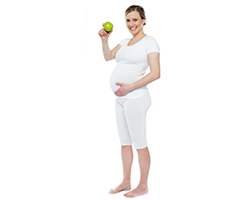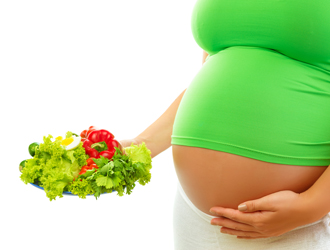Hints and guidelines to help you achieve the perfect diet for pregnant women
Eating for Two
During pregnancy you are not only feeding yourself, you are also feeding your fetus. Therefore, the importance of a healthy diet during this time increases tenfold. This article will provide you with general guidelines for a healthy diet for pregnant women.Consistency
Make sure you eat three full meals a day – breakfast, lunch and dinner. In each meal, try to combine foods from at least three different food groups. Many nutritionists also suggest eating about two small meals in between.
Variety
An ideal diet for pregnant women consists of a wide variety of types and colors of food in order to absorb all the nutrients necessary for you and your developing baby. For example, try to consume vegetables and fruits of at least 4 different colors every day.
What to eat and what to avoid during pregnancy
- Cooked- not raw – When eating meat, fish and eggs, it is very important to ensure the food is fully cooked and not raw. This will prevent the risk of bacteria spreading. Avoid eating fish that contain high levels of mercury such as swordfish, tuna and mackerel.
- Natural foods – Eat natural and healthy foods. This means limiting your intake of processed foods, sweets and snacks and avoiding alcohol.
- Iron – The body requires iron to absorb oxygen and maintain healthy cells and a strong immune system. During pregnancy, the amount of iron needed increases significantly. While the recommended daily amount for non-pregnant women is 18 mg, the recommended amount for pregnant women is approximately 27 mg. Animal products such as meat and eggs are the richest source of iron. Another source of iron is legume plants such as lentils and beans. Eating foods high in vitamin C, such as tomatoes and lemons, together with iron-rich foods can increase your body’s absorption of iron. Remember that caffeine has a negative effect on iron absorption. If drinking coffee, do so at least two hours before and after a meal.
- Calcium – Calcium is especially important for maintaining your bone mass. During pregnancy, it also helps prevent high blood pressure. The recommended daily amount of calcium during pregnancy is 1300 mg. Milk products have long been considered the top source of calcium, although there are studies claiming otherwise. Other good sources of calcium are fruits, vegetables, legumes, grains, nuts, and sesame seeds. Eating foods rich in vitamin D, vitamin C, and magnesium will assist calcium absorption in your body. As with iron, caffeine might hinder clacium absorption.
- Dietary Fiber – Dietary fiber is important for the proper functioning of your digestive system and can be found in whole grains, legumes, fruits and vegetables.
- Folic Acid – Folic acid is significant for the development of your fetus, as it reduces the risk of neural tube defects. A daily amount of 0.4-5 mg should be consumed three months prior to pregnancy as well as during the first three months of pregnancy. Most doctors would recommend a folic acid supplement, as it may be difficult for you to get the necessary daily amount of folic acid from food. Foods that contain folic acid include legumes, whole grains and citrus fruits.



